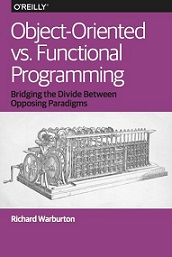
|
FreeComputerBooks.com
Links to Free Computer, Mathematics, Technical Books all over the World
|
|
- Title Object-Oriented vs. Functional Programming - Bridging the Divide between Opposing Paradigms
- Author(s) Richard Warburton
- Publisher: O'Reilly Media Inc (2016)
- Paperback N/A
- eBook HTML, PDF, ePub, Mobi (Kindle)
- Language: English
- ISBN-10: N/A
- ISBN-13: 978-1-491-93342-8
- Share This:

|
The schism between the functional and object-oriented programmers is really a false binary. Yes, the first group argues that FP is superior for a multicore world, while the second insists that OOP is better at matching technical solutions to business problems. However, as this O'Reilly report explains, this is not an either-or proposition.
This book discusses similarities between these programming paradigms and points out that both FP and OOP are actually moving closer toward one another. One prominent example is the use of lambda expressions in Java and other OOP languages such as C#, C++, and Swift.
By following examples written in Java, you will:
- Learn how lambdas (aka anonymous functions) make OOP languages better suited for dealing with parallelism and concurrency
- Understand how SOLID—OOP’s five basic principles of programming—map to functional languages and paradigms
- Explore some of the most common OOP design patterns—and how they exist in the functional world
- Richard Warburton is an empirical technologist, solver of deepdive technical problems, and works independently as a software engineer and trainer.
- Object-Oriented Analysis, Design, and Programming (OOA/OOD/OOP)
- Functional Programming and Lambda
- Introduction to Java, Basic Java
- The C++ Programming Language
- C# Programming

- Object-Oriented vs. Functional Programming (Richard Warburton)
- The Mirror Site (1) - PDF
- The Mirror Site (2) - PDF
-
 OOP: Learn Object Oriented Thinking and Programming
OOP: Learn Object Oriented Thinking and Programming
It teaches programming according to the Architecture First methodology which reacts at the companies' complaints that the school graduates are usually good in coding, but bad in software architecture.
-
 Mostly Adequate Guide To Functional Programming
Mostly Adequate Guide To Functional Programming
This is a book on the functional paradigm in general. We'll use the world's most popular functional programming language: JavaScript. This makes it possible to practice and apply your acquired knowledge each day on real world programs.
-
 Purely Functional Data Structures (Chris Okasaki)
Purely Functional Data Structures (Chris Okasaki)
This book describes data structures from the point of view of functional languages, with examples, and presents design techniques that allow programmers to develop their own functional data structures. All source code is given in Standard ML and Haskell.
-
 Functional Programming in Python (David Mertz)
Functional Programming in Python (David Mertz)
It describes ways to avoid Python's imperative-style flow control, the nuances of callable functions, how to work lazily with iterators, and the use of higher-order functions. He also lists several third-party Python libraries useful for functional programming.
-
 The Haskell School of Music - From Signals to Symphonies
The Haskell School of Music - From Signals to Symphonies
This book explores the fundamentals of computer music and functional programming through the Haskell. It explores common paradigms used in algorithmic music composition, such as stochastic generation, musical grammars, etc.
-
 Functional-Light JavaScript (Kyle Simpson)
Functional-Light JavaScript (Kyle Simpson)
This book is a balanced, pragmatic exploration of Functional Programming (FP) in JavaScript. It explores the core principles of FP as they are applied to JavaScript without drowning in all the heavy terminology.
-
 Building Skills in Object-Oriented Design (Steven F. Lott)
Building Skills in Object-Oriented Design (Steven F. Lott)
This book will help you build Object-Oriented design skills through the creation of a moderately complex family of games. It is a step-by-step guide to OO design and implementation for developers who want to use Python to create efficient programs.
-
 Naked Objects (Richard Pawson, et al)
Naked Objects (Richard Pawson, et al)
The aim of this book is to introduce you to the concept of designing business systems from naked objects, and to enable you to start building such systems using the Naked Objects framework. It outlines a lightweight methodology and provides a short tutorial.





